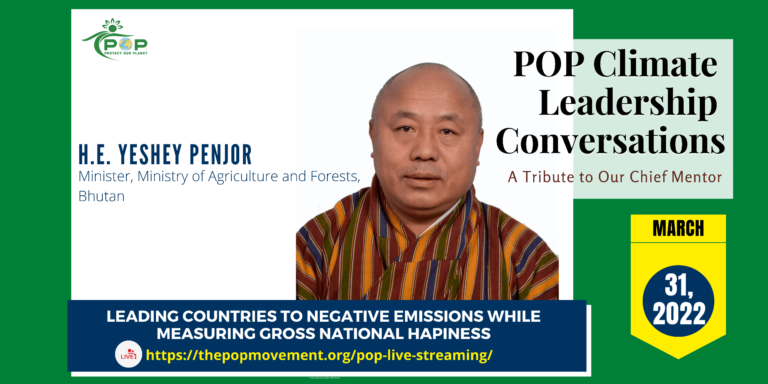
- This event has passed.
Leading countries to negative emissions while measuring Gross National Happiness with H.E Yeshey Penjor, The Minister of Agriculture and Forests, Bhutan
March 31, 2022

On March 31, 2022, we were humbled to speak with H.E Yeshey Pejor, a Bhutanese politician who has been Minister for Agriculture and Forests since November 2018. Before joining politics, he served as the Project Director of Green Public Procurement Project and served as Climate Change Policy Advisor with the United Nations Development Programme (UNDP) of Bhutan and the National Environment Commission.
Dr. Ash Pachauri asked H.E what leadership meant to him to which he shared that Bhutan is a small landlocked country and 50% of the population are dependent on agriculture. Bhutan is greatly vulnerable to climate change and has on their constitution that forest cover will never reduce to 60%. The country needs food resources (highly vulnerable to cc), renewable energy that is resilient to CC, better transportation systems and less emissions. They are compelled and forced to be dependent on development partners.
Samuel Chijoke Okorie from Nigeria in Africa asked what it means for a country to be carbon negative and how it can stay that way as it develops to which the response stated had these captivating facts; “Carbon negative means that our forests are outweighing our emissions. Sequestration capacity is greater than total emissions. Carbon neutral: Not going over forest capacity with our emissions. Biggest emissions are from transport changes to electric cars and stay committed to remain carbon neutral”.
Drishya Pathak from India asked H.E to define Gross National Happiness as well as share how it is measured and the ways that it can help improve the livelihoods of citizens and propel human society. H.E stated “Controlling human desire. If every individual is mindful of their needs, controls their greed, and agrees to live with what they have. This way we will have enough resources for everyone. GNH is more important than GDP (https://www.gnhc.gov.bt/en/). Be happy to have a comfortable life instead of aspiring to have many things. This will permit limiting emissions”.
Philo Magdalene from India shared a thought on how Bhutan is setting an example of sustainable development and the wellbeing of citizens for other nations and asked H.E how Bhutan can be a role model to all other countries to which H.E responded saying, “In 2018 the concept of GNH at the UN Assembly was accepted to create a GNH commission (0:35), National Determined Contributions (NDCs) as rich resources do exist”.
Alejandra Fragoso from Mexico wanted to know how youth can promote the transition of countries towards lower emissions through effective activism to which a response was given by H.E saying, “There have to be commitments from political leaders of rich societies across our globe. If we are not able to compromise on our individual greed we will not be able to achieve the goals. It’s very important to educate the leaders and younger generations”.
Lastly, an additional question was posed to His Excellency on how culture and indigenous practices of a country play an important role in a country becoming carbon negative to which he answered saying, “with a population less than one million, Bhutan is very rich in culture and language diversity. It has 37 different languages and is a colourful country. If we are not harmonic we will have an individualistic approach. This will create disharmony in society. Distribution of resources will not be equative. Indigenous knowledge has all the values to keep us healthy”.




